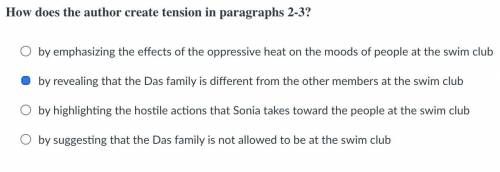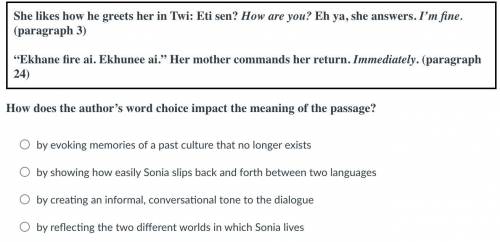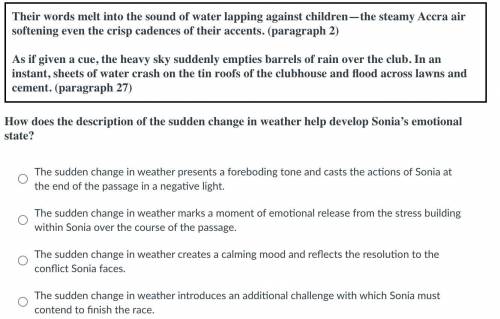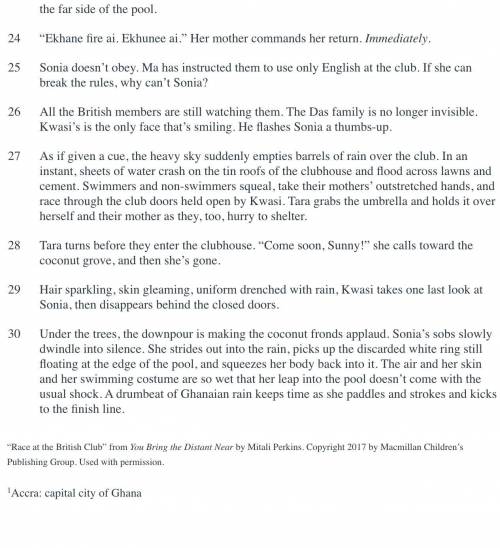
The swimmers have finished their races and are basking in the sun. It’s almost time for the beginners’ event. Tara kneels at the shallow edge, giving her little sister last-minute instructions. Floating inside her ring, Sonia pretends to listen.
2
Their mother stands alone by the deep end, sari-clad under the red monsoon umbrella she carries as portable shade from the West African sun. Kwasi, a Ghanaian waiter, offers her a bottle of icy cola. She refuses it. But the English mothers accept the cold drinks. Wearing starched blouses, armpits stained with sweat, they cluster in tight groups of two or three along the length of the pool. Their words melt into the sound of water lapping against children—the steamy Accra1 air softening even the crisp cadences of their accents. They speak briefly to Kwasi. But never to the Indian woman.
3
Sonia and Tara can swim at the British High Commission club only because their father works for a British company. The four Das family members are the only dark-skinned people at the club who aren’t employees—something even Sonia, at age eight, can’t help noticing. She feels invisible here. Sometimes she’s tempted to smash a cola bottle against the cement, but she doesn’t want to make more work for Kwasi. She likes how he greets her in Twi: Eti sen? How are you? Eh ya, she answers. I’m fine.
4
Now, with the pool water lapping against her skin, she’s ready.
5
“Time for the youngest racers to take their marks.” The British woman who’s organized this day of races likes bringing order through her megaphone.
6
“Show them what the Das family can do, Sunny,” Tara says above her.
7
Eight milky-skinned, freckled children bobbing in their rings take their places along the wall beside Sonia. They’re all six or seven years old, but three are bigger than she is. I’m older, she tells herself. I’ll outsmart them. Her toes push against the rough concrete of the pool floor. She clutches her white plastic ring under her arms, eyes fixed on the flaking blue paint on the far wall. She has to swim there and back. Fast.
8
Tara crouches near Sonia on the edge of the pool, silent now. The whistle blows.
9
“Good start, Bobby!” a mother calls. “Go, Sunny, go!” Tara shouts.
10
Sonia pummels the water with her arms and pushes it behind her with her legs. Her eyes are fixed on the far wall, which is drawing closer by the second. Faster and faster she goes, churning the chlorine into the air. Redheads and towheads are falling out of her line of vision. The wall is just in front of her. All she has to do is touch it, turn, and swim back. The others are almost half a length behind her now.
11
She’s going to win.
12
She’s going to beat them all.
13
But just before she reaches the wall, she sees a tilted dome of red perched beyond it. Her mother is squatting at the edge of the pool, one arm outstretched toward the water. The hem of her sari is wet.
14
Sonia senses what’s about to happen. She tries to slow her momentum through the water, but it’s too late. Her mother catches hold of the white plastic ring and hauls it to the edge. Sonia fights, bracing her feet against the wall, but the pull is too strong. Her mother’s hands grip her tightly under her arms and her body slides up, out of the pool, out of the ring.
15
“You’ve won, Baby,” her mother says, throwing a towel around Sonia and pulling her into the squat of her sari.
16
“No! NO! NO!”
17
The other racers touch the wall, turn, and begin to bob and kick and splash back to the shallow end. Tara is running along the pavement toward her sister and mother, weaving through swimmers, waiters, and British women. None of them are watching the race in the pool. Every eye is on Sonia, who is bellowing and struggling to escape. Wildly, her fists beat against the arms and thighs that enclose her.
18
Tara reaches them, panting. “Ma, the race wasn’t over!”
19
“That. Woman. Said. One. Lap,” their mother answers, still wrestling to contain Sonia.
20
“One lap means there and back! She could have won!”
21
The winner has reached the finish line. Belatedly, the distracted crowd notices and begins to cheer.
22
“It is only a game, Baby,” her mother says.
23
“Be quiet.” With a howl of rage, Sonia breaks out of their mother’s grasp. She flings the towel on the cement and kicks the umbrella. Then she runs to hide in the coconut trees on the far side of the pool.






Answers: 2


Another question on English

English, 21.06.2019 22:10
You have to go. you have to, yer the only doctor. go ahead on, you," bruh fox say. big doc rabbit went down to the brook again. the water was so cool and ribbly and it kept the crock of cream so fresh and cold. doc rabbit drank about half of the cream this time. then he went back up to brother fox with the hard labor of raisin the roof. heard tell about this phrase remind readers that these stories were usually told, not read. which line from the excerpt is an example of personification?
Answers: 3

English, 22.06.2019 03:00
In about two hundred words, explain how the author's use of folktales and symbolism add meaning to the story and convey the central theme of the novel: the disintegration of the traditional igbo society as a result of its contact with european practices and beliefs.
Answers: 3

English, 22.06.2019 04:00
From the story " saving the children"why is nicholas winton honored today? why did jewish people in czechoslovakia want to get their children out of the country? where did nicholas winton do his work saving the children? why was it hard for winton to find refuge for the children? to confirm your understanding, write a summary of “saving the children.”(a) aside from winton, who were the interview subjects? (b) analyze what do most of the interview subjects have in common? (a) why wasn’t this story told until 50 years later? (b) infer what does this say about winton’s character? summarize how did winton finally manage to get the children out of czechoslovakia? (a) support what was the “lie” hugo meisl’s parents told hugo and his brother before they sent them away? (b) make a judgment was this the right thing to do? explain. essential question: how do we remember the past? what have you learned about the nature of heroism from reading this article?
Answers: 1

English, 22.06.2019 06:00
And are the two main components of poems that you need to be capable of making inferences and drawing conclusions about. and are the two main components of poems that you need to be capable of making inferences and drawing conclusions about. think its facts and clues
Answers: 1
You know the right answer?
The swimmers have finished their races and are basking in the sun. It’s almost time for the beginner...
Questions


Social Studies, 20.05.2020 22:04


Mathematics, 20.05.2020 22:04

Spanish, 20.05.2020 22:04

Mathematics, 20.05.2020 22:04


Chemistry, 20.05.2020 22:04




Biology, 20.05.2020 22:04

English, 20.05.2020 22:04


Mathematics, 20.05.2020 22:04




Arts, 20.05.2020 22:04




